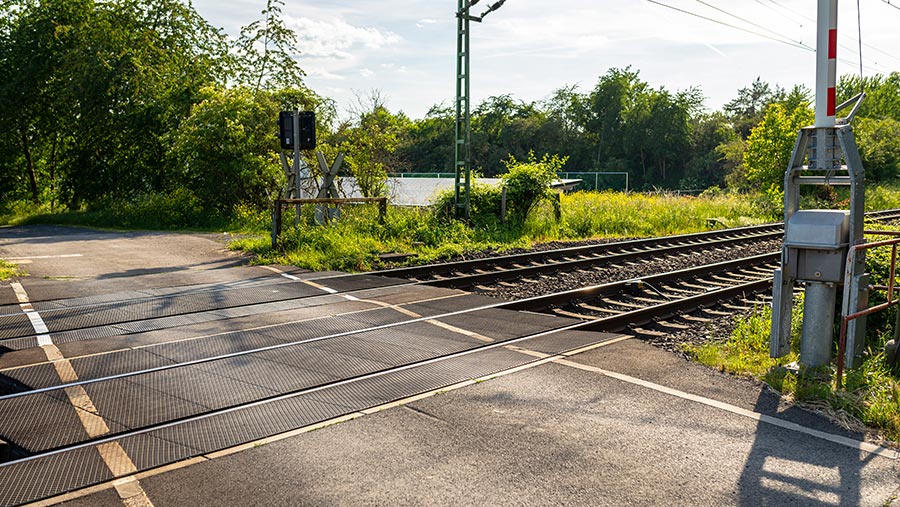Rail strikes could increase level-crossing risk to farmers
 Michal/Adobe Stock
Michal/Adobe Stock Planned rail strikes could leave farmers and growers facing extra risks at unmanned level crossings, Network Rail has warned.
Many of the UK’s 2,000 “user-worked crossings” traverse farmland or are on footpaths and small rural roads. They are high risk because there is no automatic signalling system.
Instead they rely on the user to contact the rail operator by telephone to get permission to cross the track. But about one-third of railway line fatalities occur on this type of crossing each year.
See also: Rising costs strain farmer and retailer relations on pricing
According to government data, the Rail, Maritime and Transport (RMT) trade union strikes are coming at the worst time of the year when crossings are used more frequently by heavy, long vehicles engaged in harvest or field work.
However, despite this risk, the RMT warned that its signalmen may not be manning phone lines during forthcoming strikes.
Network Rail said crossing users could find that phone line requests for permission to cross the railway will go unanswered from 21 June.
It has put in place an alternative system that must be followed if the initial call is not picked up.
Instructions for the back-up process will be highlighted using posters or stickers close to the yellow telephone at the crossings.
Level-crossing users must:
- Call the signaller as normal
- If there is no answer, make a second call to the number provided on the additional notice at the yellow phone box
- A recorded message will say whether it is safe to cross or will provide further instruction.
Network Rail stressed that trains could still be running even if a call is unanswered.
In this case, the track must not be crossed until permission is given. For further information, contact the 24-hour Network Rail helpline 03457 11 41 41.
Safety advice
Evita Van Gestel of NFU Mutual Risk Management Services, said: “Level crossings may lie unused for much of the year, but then at peak times, such as during harvest, may be used intensively.
“These peak times are also when farms are more likely to play host to seasonal workers or contractors, so it is essential that both farmers and their contractors are aware of how to use crossings safely.”
Ms Van Gestel added: “With warnings of disruption from the RMT strike, it is more important than ever to follow our safety advice and, above all, be patient. Trains will still be running and farmers and their contractors should take care.”
Safe crossing
Before crossing
- Familiarise yourself with the warning signs, gates and lights on any crossings on your land, make sure you understand what they mean and what you should do before you cross
- Make sure the approach to the crossing is kept clear of vegetation, equipment or other obstacles that may impede access or sight of approaching trains
- Be aware of anything that may affect your ability to cross safely and do not try to cross if it’s dangerous to do so
- Report any problems to Network Rail (contact numbers should be available at the crossing point)
- Remove headphones and other distractions (such as mobile phone) that prevent you from hearing or seeing approaching trains before crossing
- If possible, do not cross in darkness, fog or other visibility-limiting conditions
- Ensure workers near a railway line or crossing wear high-visibility vests
When crossing
- Never attempt to cross if you can see or hear a train approaching
- Check that the exit of the crossing is clear – look both ways
- Follow the instructions on the crossing
- If a yellow phone box is present, always contact the signaller before crossing. Be patient if there is a delay and follow any temporary instructions if the phone call is unanswered as a result of the strike. If there is no telephone to contact the signaller, use a second person to assist and act as lookout
- If you are in any doubt about your ability to cross safely – for example, if you are crossing in a long vehicle or with low ground clearance – contact the Network Rail helpline at least 24 hours beforehand
- When crossing with livestock, take them in a vehicle or trailer if possible
- If your vehicle gets stuck:
* Immediately exit the vehicle and stand well clear of the crossing
* Contact the Network Rail Helpline - Never assume you can “beat” an approaching train
Source: NFU Mutual Risk Management Services

